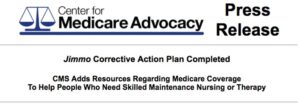
For Immediate Release August 28, 2017
As ordered by the federal judge in Jimmo v. Sebelius, the Centers for Medicare and Medicaid Services (CMS) published a new webpage containing important information about the Jimmo Settlement on its CMS.gov website. The Jimmowebpage is the final step in a court-ordered Corrective Action Plan, designed to reinforce the fact that Medicare doescover skilled nursing and skilled therapy services needed to maintain a patient’s function or to prevent or slow decline. Improvement or progress is not necessary as long as skilled care is required. The Jimmo standards apply to home health care, nursing home care, outpatient therapies, and, to a certain extent, for care in Inpatient Rehabilitation Facilities/Hospitals.
The Jimmo webpage and other elements of the Correction Action Plan should help ensure that the Jimmo Settlement is implemented correctly and that it opens doors to Medicare coverage and necessary care for beneficiaries who require maintenance care, including people with long-term, progressive, or debilitating conditions. As required by the Court, CMS also provided additional training for Medicare decision-makers.
Judith A. Stein, Executive Director of the Center for Medicare Advocacy, which is lead counsel for the nationwide class of Medicare beneficiaries said, “People living with MS, Parkinson’s Alzheimer’s, paralysis and other long-term conditions have waited long enough for this relief. We hope that the new CMS education and information, which can be found at CMS.gov and printed out with the CMS logo, will help convince providers that Medicare really is available for people who need this critical maintenance care.”
“After years of fighting over this standard in court, we are hopeful that Medicare has finally acknowledged that beneficiaries with long-standing and chronic problems are entitled to maintenance skilled care to prevent or slow decline in their overall condition,” said Michael Benvenuto, of Vermont Legal Aid, co-counsel for the Jimmo plaintiffs.
The new webpage contains an “Important Message About the Jimmo Settlement,” in which court-approved language emphasizes that the Settlement “may reflect a change in practice” for providers and Medicare decision-makers who erroneously believed that the Medicare program covers nursing and therapy services only when a beneficiary is expected to improve. Indeed, the new education and Jimmo webpage are important because many health care providers still operate under this misconception, leading beneficiaries to be wrongly denied needed services such as physical and occupational therapy.
This was the case, for example, for Mrs. B, who was denied necessary on-going physical therapy, needed to maintain her condition after spinal surgery. While she had begun to walk again independently after nursing home care, and out-patient PT, when the PT ended because it was “maintenance only,” Mrs. B declined and was no longer able to ambulate independently.
One of the “Frequently Asked Questions” posted on the Jimmo CMS.gov page clarifies that this should not happen: “The Medicare program does not require a patient to decline before covering medically necessary skilled nursing or skilled therapy.”
The Jimmo webpage contains fifteen such “Frequently Asked Questions,” which dispel other mistaken beliefs. One answer, confirms: “Skilled services would be covered where such skilled services are necessary to maintain the patient’s current condition or prevent or slow further deterioration so long as the beneficiary requires skilled care to the services to be safely and effectively provided.”
Judge Christina Reiss of the U.S. District Court in Vermont ordered the corrective action plan in February 2017 after finding that CMS was in breach of the original Jimmo settlement agreement, which was reached in 2013. In addition to the webpage, the Corrective Action Plan required CMS to offer additional training about coverage for skilled maintenance care for Medicare’s contractors and adjudicators who decide whether coverage will be granted.
Under the original Jimmo Settlement, CMS revised several chapters of its policy manuals (including those for Skilled Nursing Facility, Home Health, Out Therapy and Inpatient Rehabilitation Facility.) CMS also held an educational campaign to clarify that improvement is not required for coverage of skilled care. Lawyers for the Jimmo plaintiff class requested further action from the court when it became clear that too many people were still being wrongfully denied Medicare coverage – in part because many medical providers had not been adequately educated, and in part because many providers were still skeptical that Medicare would alter its coverage practices. The new webpage offers CMS’s official imprimatur on the correct legal standard that improvement is not required when there is a need for skilled care.
For more information about Medicare coverage for maintenance care and CMS’s new Jimmo webpage, register for the Center for Medicare Advocacy’s free webinar, to be held September 27, 2017 at 3:00pm EDT/12pm PDT.
Contact: Matthew Shepard, Communications Director MShepard@MedicareAdvocacy.org, (860) 456-7790
View as webpage: http://www.medicareadvocacy.org/jimmo-corrective-action-plan-completed
The Center for Medicare Advocacy, Inc., established in 1986, is a national nonprofit, nonpartisan law organization that provides education, advocacy and legal assistance to help older people and people with disabilities obtain fair access to Medicare and quality health care. The Center is headquartered in Washington, DC and Connecticut, with attorneys throughout the country.





















0 comments